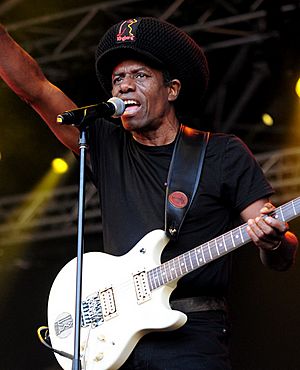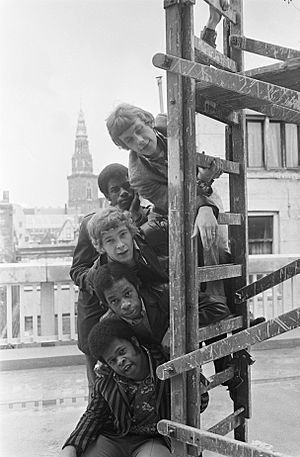Eddy Grant facts for kids
Quick facts for kids
Eddy Grant
|
|
|---|---|

Grant in Perth, Australia in 2009
|
|
| Background information | |
| Birth name | Edmond Montague Grant |
| Born | 5 March 1948 Plaisance, British Guiana (now Guyana) |
| Origin | London, England |
| Genres | |
| Occupation(s) | Musician |
| Instruments |
|
| Years active | 1965–present |
| Labels |
|
Edmond Montague Grant (born 5 March 1948) is a singer, songwriter, and musician from Guyana and United Kingdom. He is famous for mixing different music styles like pop, rock, soul, funk, and reggae. He also helped create a music style called "ringbang".
Eddy Grant was a founding member of the Equals. This was one of the first mixed-race pop groups in the UK. They are best known for their hit song "Baby, Come Back", which Eddy wrote.
Later, as a solo artist, he had big hits like "I Don't Wanna Dance" in 1982. His song "Electric Avenue" from 1983 was a huge international success. He was even nominated for a Grammy Award for it. He is also well-known for his 1988 song "Gimme Hope Jo'anna", which spoke out against apartheid in South Africa.
Contents
Early life and musical beginnings
Eddy Grant was born in Plaisance, Guyana, in 1948. He later moved to Linden. His father, Patrick, was a trumpet player.
In 1960, Eddy moved to London, England, to live with his parents. He went to Acland Burghley Secondary Modern where he learned to read and write music. He loved Chuck Berry and decided he wanted to be a musician after seeing him perform.
Music career highlights
The Equals band years
In 1965, Eddy Grant started the band the Equals. He played guitar and sang backup. The band had two successful albums. Their song "I Get So Excited" was a minor hit.
In 1968, their song "Baby, Come Back", written by Eddy, became a number one hit in the UK. This song was also a hit again in 1994 when Pato Banton covered it. The Equals had five more top 40 hits in the UK by 1970.
Eddy also wrote "Police on My Back" for the Equals. This song was later recorded by the Clash and Willie Nile. Another Equals song, "Green Light", was recorded by the Detroit Cobras.
During this time, Eddy also wrote and produced music for other artists. He worked with bands like the Pyramids and Prince Buster. He even started his own record label called Torpedo.
Starting Ice Records
On January 1, 1971, Eddy Grant had a heart attack and a collapsed lung. Because of this, he left the Equals. He wanted to focus on producing music.
In 1972, he opened his own recording studio called Coach House Studios. In 1974, he started his own record label, Ice Records. He produced music for other artists, including the Pioneers. He also produced early songs for his younger brother, Rudy.
Solo music success
Eddy Grant released his first solo album in 1975, but it did not become popular. His 1977 album Message Man also did not make a big impact.
His solo career took off in 1979 with the album Walking on Sunshine. This album included the UK top 20 hit "Living on the Frontline". In 1980, he had another top 10 hit with "Do You Feel My Love". His 1981 album Can't Get Enough was his first to enter the UK Albums Chart.
From 1982, Eddy Grant lived in Barbados. He opened his Blue Wave Studios there. In the same year, he released his most successful album, Killer on the Rampage. This album had his two biggest solo hits: "I Don't Wanna Dance" and "Electric Avenue". "I Don't Wanna Dance" was number one in the UK for three weeks. "Electric Avenue" reached number 2 in both the UK and the US.
After this, he had a quieter period. His song for the movie Romancing the Stone in 1984 did not do well as a single in the UK. His albums Going for Broke (1984), Born Tuff (1987), and File Under Rock (1988) did not produce any more hit singles.
Eddy Grant returned to the charts in 1988 with "Gimme Hope Jo'anna". This song was a number 7 hit in the UK. The South African government banned the song because it was against apartheid. In the late 1980s, he also focused on other businesses, like music publishing and a nightclub. His Blue Wave studio became very popular and was used by famous bands like the Rolling Stones and artists like Sting.
Eddy Grant continued to release albums in the 1990s, including Barefoot Soldier (1990) and Paintings of the Soul (1992). In 1994, he introduced a new music style called ringbang at a festival in Barbados. He said ringbang brings together all rhythms from Africa. In 2000, he organized the Ringbang Celebration festival. In 2001, a new version of "Electric Avenue" reached number 5 in the UK.
In 2004, Eddy Grant created a song for a yogurt drink commercial. On April 18, 2006, he released the album Reparation. The title of this album calls for restitution for the transatlantic slave trade. His next album, Plaisance, was released in 2017.
In 2008, he performed at Nelson Mandela's 90th birthday concert. He also played at the Glastonbury Festival in the UK. As of 2023, Eddy Grant had not allowed his music on streaming platforms like Apple Music and Spotify. He did this to protest how artists are paid. However, in February 2024, his album Killer on the Rampage became available on these services again. This included the original version of "Electric Avenue."
Lawsuit against Donald Trump
In September 2020, Eddy Grant sued Donald Trump, who was the US President at the time. This was because Trump used Grant's song "Electric Avenue" without permission. The song was used in a video for Trump's presidential campaign. The video was viewed over 13 million times on Twitter before it was taken down.
Trump tried to have the lawsuit dismissed, saying he had "fair use" of the song. However, the court ruled that fair use did not apply. On September 13, 2024, the court decided that Trump had to pay Eddy Grant for using the song without permission. The exact amount of money was to be decided later.
On November 20, 2024, the two sides settled the lawsuit. The details of the settlement were not made public.
Awards and recognition
In 2016, Eddy Grant was given a Lifetime Achievement Award by the government of Guyana. In 2005, the Guyana Post Office Corporation honored him with a postage stamp. The stamp featured his picture and the ringbang logo. Eddy Grant was also nominated for a Grammy Award for his song "Electric Avenue" in 1984.
Discography
- Eddy Grant (1975)
- Message Man (1977)
- Walking on Sunshine (1979)
- Love in Exile (1980)
- Can't Get Enough (1981)
- Killer on the Rampage (1982)
- Going for Broke (1984)
- Born Tuff (1986)
- File Under Rock (1988)
- Barefoot Soldier (1990)
- Paintings of the Soul (1992)
- Soca Baptism (1993)
- Hearts and Diamonds (1999)
- Reparation (2006)
- Plaisance (2017)
See also
 In Spanish: Eddy Grant para niños
In Spanish: Eddy Grant para niños
- Black British people
- Music of Guyana
- Caribbean music in the United Kingdom
 | Valerie Thomas |
 | Frederick McKinley Jones |
 | George Edward Alcorn Jr. |
 | Thomas Mensah |


